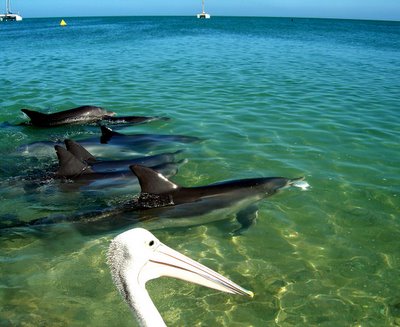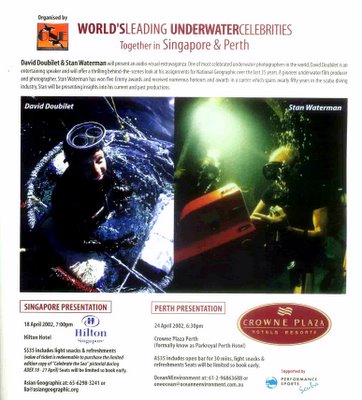
Above : A pod of dolphins entertain us at Monkey Mia while a pelican tries to steal the limelight! Watch out laters for a Monkey Mia blog.
When you think of other men who opened our doors, who else comes to mind?
PETER BENCHLEY, the author of the bestseller "Jaws", was unintentionally responsible for making millions of beachgoers reluctant to take a dip in the water! I just learnt that he left this earth more than a week ago at the age of 65 on 12 Feb 2006.
Many were so deeply traumatized by the movie that they continue to associate sharks with : monster, blood, panic, suffering, and eventually death! can u imagine? More than 20 million copies of the novel were sold! And the Steven Spielberg blockbuster "Jaws" must have reached out to gazillions of households, poisoning their minds!
It certainly scared the living daylights out of many shark-phobics I know, including Maximuzz who recently overcame his fear of sharks as he reluctantly grabs hold of an adult which was fished out by our tour guide at a private beach near Shark Bay. The poor shark was released, but eventually recaught and turned into the "fish" in "fish and chips" the following day! Full pictorial story here.

Above : Baywatch at Shark Bay!
Ironically, Benchley was an avid conservationist. Benchley's interest in sharks began with childhood visits to Nantucket Island in Massachusetts and heightened in the mid-1960s when he read about a fisherman who had caught a 2060 kg great white shark off Long Island. Although Benchley wrote based on his wide knowledge about sharks, he later took great pains to explain that "Jaws" was just a story. For the full story, lookey here.
Benchley writes in his new book, Shark Trouble: "We knew so little back then, and have learned so much since, that I couldn't possibly write the same story today. I know now that the mythic monster I created was largely a fiction. I also know now, however, that the genuine animal is just as—if not even more—fascinating."
But by then, the damage had been done. The world started sharing stories of similar shark attacks, which reinforced the "Sharks are Bad, Bad, Bad" image! I doubt the movie has impacted the sharks fin trade much, except to give mainly Chinese consumers an excuse to retort "Better eat them, otherwise they'll eat you!"
Since writing JAWS, Benchley has done approx 40 TV ocean wildlife shows. Although there were close shaves with sharks, he remakrs that he has never been hurt by any sea creature, except for jellyfish and sea urchins. He says in an interview on his website, "If you're careful, you don't have to worry about being attacked by sea creatures. I have been frightened by sharks and moray eels and killer whales and sperm whales, but never hurt."
So, how to you open the eyes of consumers who have probably never ever crossed paths with a shark save for the occasional visit to the Underwater World or slurping down that bowl of spiced up soup at the wedding banquet? Education is the way to go, and that's what many shark conservation groups like WildAid have resorted to doing. Flip the channel to Discovery, Animal Planet or Discovery, and you're never short of documentaries about underwater creatures, many screened under the banner of conservation groups. WildAid has been working closely to Peter and they have posted a Tribute to Peter Benchley page after his demise.

So.....so what can an underwater videographer wannabe in Singapore like me do to change the world? I only found out the answers after I joined an underwater video competition organised by Asian Geographic and managed to get an inaugural Environmental Award. What thrilled me more was that they had specially created a new conservation category just for my video. *grin*
What drew me to the competition? David Doubilet and Stan Waterman! They were both icons in the underwater world, one of the world's leading photographers and videographers. The latter was co-director of underwater photography and second unit in the production of The Deep, based on Peter Benchley's best-selling novel. Just meeting them was a real honour and privilege!
And they were going to give a presentation at the Hilton right here in Singapore! Woo hoo! (see brochure above extracted from Asian Geo mag). Heard that they were also judges for the photography and videography competitions. I looked at my Sony TRV 900E, my Stingray housing and my home PC suited with a canopus videocard. How could I possibly hope to draw the attention of these judges? It was such a long shot but I'll give it a try!
But no, as the wise Yoda once said, "Do, or do not, there is no try"! And so the journey began, way before this video competition surfaced...
My friend Alex Lin counselled me many years ago, "Get out there and start shooting! It's as simple as that!" Several years of hesitation and talking later, I finally started walking!
Friends like Chak, the Tattoo Master and Rohan generously lent me their underwater video equipment and showed me the ropes on how to take decent underwater footages. My video guru, Ah Bong (a car mechanic turned wedding videographer, who finally ventured off to NZ in search of the life of a car mechanic) taught me all there is to know about video editing. I quit my job and over one year, experienced the joys and privileges of working on a movie ("Talking Cock The Movie"), documentary (Tan Pin Pin's "Moving House") and even made my own short experimental mockumentary, "Somewhere Over The Long White Cloud" which was aired at the Goethe Institute as part of the Singapore International Film Festival.
But then I wanted to go back to the root of my interest in videography, which was to make an underwater video that mattered.
During my year off from my bread and butter job, I joined a SIF Youth Expedition Project which brought me to Cambodia as a dive volunteer for the Koh Kong Marine Conservation project. I helped to spearhead a video production of our work there, which was presented to the Cambodian government to educate them about the marine environment in waters off Koh Kong. Something really good resulted from these visits to Cambodia and other countries which followed - a local marine conservation group called BlueWaterVolunteers was born.
I met some pretty hard-core marine biologists during my Koh Kong trip, who then introduced me to other naturalists and conservationists in Singapore. Tse-Lynn announced to the group back in 2002 that Chek Jawa, a marine haven in our little island of Ubin, was under threat of reclamation. We camped out several nights at the haunted House No. 1 located at the eastern tip of Ubin, and woke up in the wee early hours of the morning to film the marine life before it was all gone.
I remembered my first step on Chek Jawa territory. I was stunned by the wealth of marine life on our local shores! I immediately had flashbacks of my expensive dive trip to Papua New Guinea, touted as a dive haven. I recalled spending a good 15 minutes, waiting behind 3 other photographers, hoping to catch an anemone shrimp posing against a carpet anemone. Who would have thought, right at home in an island a mere 15 minutes away from mainland Singapore, I would be standing in the middle of a field of carpet anemonies with these shrimps sticking out their tongues at me (if they had any)!
Chek Jawa was a turning point for me on many counts. It was when I first met and filmed Siva and some other folks from the Nature Society of Singapore. I found out how passionate they were about our local wildlife, and it was they who dedicated many months of work in an attempt to change the minds of the authorities. Photos and videos (from Eric) were shown at closed door sessions. Eventually, their efforts paid off as the government decided to abandon current reclamation plans, for as long as the land is not needed. I was glad that it all worked out! But deep inside, I felt guilty about not using the footage that I took at Chek Jawa. What's the point of taking rolls of tape when it's going to end up in the storage cabinet?
So, when it came to the crunch of what to submit for a video competition titled "Celebration of the Sea", I decided to redeem myself : "Chek Jawa" was the way to go! It was a funny thought that none of the footages were taken underwater, even though I carried my housing while biking from the jetty to House No 1. To make up for it, I used footage of other marine life shot in Manado, Tioman and Aur for a second video. I submitted both videos, and hoped for the best.
One day, I was woken up by a phonecall from Michael Aw from Asian Geo magazine informing me that I had won a special prize for my Chek Jawa video, and that my other short film was one of the top 5 films chosen for the video competition! *faint*
Not only did I get a plaque and a goody bag for my efforts, I got David to autograph his Water Light Time book and even got a picture taken next to Stan (above)! *smile like a schoolgirl*
The following year, I submitted a short film featuring a whaleshark I shot at Anambas, which was part 1 of a trilogy which I had edited for WildAid, called "Goodwill Hunting". I had to submit the first one since the short film had to be filmed and edited by the filmmaker. I also submitted the WildAid trilogy hoping that the magazine found the material interesting enough to screen for educational purposes. I didn't care if I didn't get a prize, so long as the short film was shown and the message disseminated.
This time round, the exhibition was held in KL, and I had taken a bus all the way up north. I was glad to know that Ria of Wild Singapore fame had received the 2003 conservation prize. Excellent choice and definitely well deserved! The magazine did not show any of the films that I submitted. I did not hear from them this time round. I can't say I was not disappointed since I felt so passionately about the message behind the whaleshark video, but life goes on.
Before I left for Singapore, I was fortunate to have had a short chat with Dr Cardan Wallace, publisher of several books on coralife. In the conversation, she mentioned that she was impressed with a short video that she'd seen in Australia about a special place in Singapore which had so much marine life to offer. No one would have thought that such a place existed in Singapore.
It was at that moment that I knew I had made a difference in my smallish way. :)




No comments:
Post a Comment